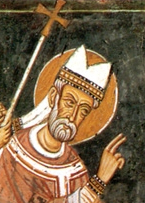Saint Sylvester's Day



Silvester (also spelled sylvester, szilveszter, or sylwester) is the day of the Feast of Pope Sylvester I, a saint who served as Pope of the Catholic Church from 314 to 335 and oversaw both the First Council of Nicaea and Roman Emperor Constantine I's conversion to Christianity.[1] The feast day is held on the anniversary of Sylvester's death, 31 December, a date that, since the adoption of the Gregorian calendar, has coincided with New Year's Eve. Eastern Orthodox Churches celebrate Sylvester's feast day on 2 January.
Background
Because of this coincidence, several countries, primarily in Europe, use a variant of Silvester's name as the preferred name for the holiday; these countries include Austria, Bosnia and Herzegovina, Croatia, Czech Republic, France, Germany, Hungary, Israel, Italy, Liechtenstein, Luxembourg, Poland, Slovakia, Switzerland, and Slovenia.[2]
In Israel, there is a belief among some that conflates the Slavic tradition of Novy God with this feast day, contributing to the belief that it is a celebration of an anti-Semitic pope who convinced Constantine to prohibit Jews from living in Jerusalem and promoted anti-Semitic legislation. A possible source of this belief is the fact that the feast day was known by many immigrants from Europe who came to the country around the time it became a Jewish state.[2]
References
- ^ A History of New Years
- ^ a b Cohen, Ariel (31 December 2014). "Celebrating an anti-Semitic pope on Sylvester". Jerusalem Post. Archived from the original on 31 December 2014. Retrieved 31 December 2014.
External links
 Media related to Silvester at Wikimedia Commons
Media related to Silvester at Wikimedia Commons
